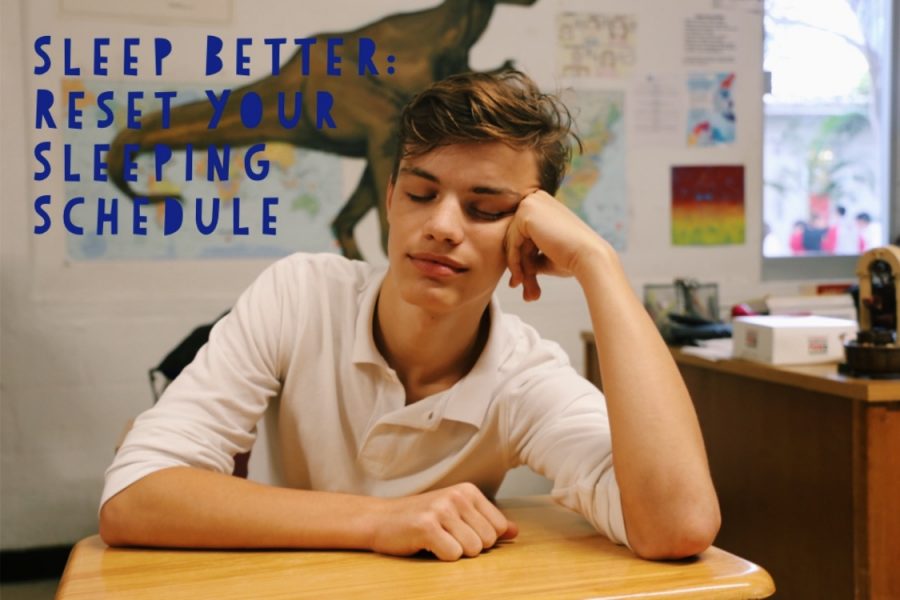Tips for Resetting Your Sleep Schedule
Due to an unfitting sleeping schedule, many students lose focus throughout a class because of an unhealthy and unsuitable plan.
Students are notorious for not getting sufficient sleep. When they are not spending time completing class assignments, they are socializing with their friends late at night, losing precious hours of sleep. Managing imminent deadlines is considerably challenging for those who participate in after-school activities; being an active member of any club already takes up a large portion of a person’s schedule. Generally, sleep is not prioritized due to people’s busy schedules. Understanding how to achieve a well-rounded sleeping schedule is a fundamental step towards being efficient and functioning every day.
A sleeping schedule is a consistent time frame in which a person regulates their body’s clock by resting after a long day’s work. Stabilizing a plan for the day will help students maintain a balanced lifestyle. There are many different ways of establishing a plan that works around their regular schedules.
“I get home as early as possible so I can sleep a good seven hours, then wake up and do homework at around 11 P.M. until I have to get ready for school. This schedule works better for me than the typical sleeping schedule because I always find myself too tired to work when I get home from school. It also improves the quality of my work because I do not feel like I’m against the clock trying to finish things before bedtime,” senior Arianna Rodriguez said.
A well-adjusted sleeping schedule aids in living happier and healthier. The relaxation allows for ease and peace of mind. Although, first, a person must become familiar with how to create the schedule, in ways such as:
1) Learning to Prioritize
Students take a variety of classes and engage in several events. Each one is likely to have a distinct deadlines, therefore, a student needs to recognize the level of importance of each task and schedule a time to do it. For instance, if a student has a paper due the next day but wishes to exercise as well, the student must determine what needs to get done. First, complete the paper and then wake up earlier the following morning to exercise. This would be more comfortable and sustainable for the student’s wellness.
2) Avoiding Caffeine
Achieving safer sleeping habits requires one to avoid any kind of caffeinated substances. Caffeine is in many substances such as coffee, iced tea, soda, chocolate, including multiple over-the-counter medications. Considering it is a stimulant, it increases alertness and energy that may alter relaxation. The caffeine is set to block sleep-inducing chemicals that are located in the brain. Eliminating it will make it easier for a person to receive the necessary rest.
3) Setting the Mood
Emotionally stabilizing yourself will help sustain a well full peace. Many people prefer listening to calming music similar to jazz, before proceeding to bed. Others favor soothing stretches that allow for the body to improve in breathing and reduce stress. Accordingly, calming the mind reduces stress and allows for slumber.

I understand that balancing my work and sleep schedule is key. Every morning I make sure to take at least twenty minutes to do yoga, just to clear my mind, feel happy, and stay healthy
— junior Chloe Grant
4) Sticking to your Schedule
Once you have secured a beneficial routine, the final step is to remain on track. Constantly overlooking the sleeping schedule will damage your body’s clock negatively. Maintain the schedule created and stick to it regularly for a significant advantage.
“I usually go to sleep around 12:30 to 2:00 AM. I consider it a good day if I get at least 4 hours of sleep because it works well for me, and I get my work done,” junior Sofia Rebull said.
A lack of rest may generate stress and cause bad performance on assignments. Scheduling a proper time to sleep may be challenging, but finding a fitting plan is propitious. It does not only benefit health, however, but it also contributes to successful academic achievements overall.
Your donation will support the student journalists of Coral Gables Senior High School. Your contribution will help us cover our annual website hosting costs.

Melanie Ozuna is a rising senior currently enrolled in the International Baccalaureate (IB) program here at Coral Gables Senior High. Melanie first discovered...












